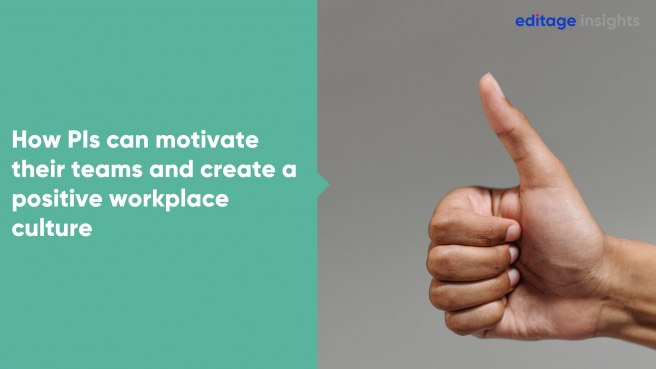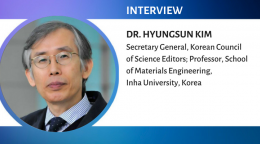How PIs can motivate their teams and create a positive workplace culture

One perk of working with other researchers is that you get to meet many intelligent, interesting people, each with their own range of interests. People become researchers for many reasons, but one trait that they almost universally share is a love for the pursuit of knowledge. While that may be a noble goal, why do so many researchers eventually lose motivation and suffer from burnout? Furthermore, how can research group leaders maintain and improve the motivation necessary for members to do their incredible work?
The challenges of motivation in research
Research is a demanding profession. Researchers of all levels are under constant pressure to deliver results, and success as a researcher depends not only on knowledge, but on grit, communication skills, and work ethic. A high level of motivation can allow people to persist in difficult work and prevent occupational burnout; for example, one qualitative study of athletes found that self-determined motivation is a negative predictor of burnout1.
Humans are not machines that can consistently output results at a fixed level. One’s emotional state and motivation are predictive of positive outcomes in research2, and a loss of motivation can contribute to burnout, which is further exacerbated by stressful situations such as the COVID-19 pandemic3. Motivation is often considered a personal, intrinsic trait, but substantial evidence suggests that motivation is greatly influenced by social and environmental factors4.
Facilitating motivation as a principal investigator
Motivation is crucial for success in research, and principal investigators (PIs) have the responsibility to facilitate motivation in their team.
The PI can be likened to an orchestra’s conductor. Using their extensive knowledge, personal rapport with their musicians, and organizing skills, a good conductor gets many people with different roles to work in harmony and achieve something special. Likewise, coordinating a team of researchers takes similar skills. The PI can be the make-or-break factor in ensuring that the motivation of a research team remains high, and being able to keep a team motivated may be the key element for a successful research team5.
Motivation is often divided into intrinsic and extrinsic motivation. Intrinsic motivation comes from within oneself, driven by personal enjoyment and satisfaction, while extrinsic motivation comes from external factors such as rewards or social pressure. An effective manager should take both intrinsic and extrinsic motivators into account when assessing the motivation of their team and proactively work to meet their team’s needs.
Tips to keep your research team motivated
Here, I’d like to offer some tips for PIs to keep their team motivated and engaged.
1. Provide clear goals and responsibilities
At the beginning of each phase of a research project, it is vital to provide clear, actionable goals for all team members, which not only helps you organize tasks, but also motivates team members6. As in Locke & Latham’s Goal-Setting Theory7, setting manageable goals can improve motivation and performance. Additionally, it is useful to reassess these goals with each change of staff or at any time when priorities change. Including opportunities for team members to communicate with you on their progress towards meeting their goals can provide them with the extrinsic motivation to give you good news on their progress.
Some researchers have even implemented agile organizational approaches, such as Scrum, in research settings8. Scrum involves breaking down a project into smaller, manageable chunks called sprints. The team works together to complete a set of prioritized tasks, and daily stand-up meetings are done to ensure everyone remains on track.
2. Be proactive with feedback
Everybody likes to hear that they are doing a good job, and we all want to hear that we’ve been doing something wrong before it can snowball into a bigger problem. Providing opportunities for feedback allows a PI to provide much-needed praise or gentle corrective action.
Feedback doesn’t need to resemble a formal performance review. A simple verbal acknowledgment or brief can go a long way to guiding researchers and keeping them motivated. Research has found that even symbolic awards, such as a “thank you” card, can go a long way to boost motivation9.
3. Have an “open door”
An “open door” policy can improve your communication with the team by providing more opportunities to meet on their terms, helping them feel more supported at work10. Providing the opportunity to make their voices heard can aid motivation and provide favorable outcomes both for managers and subordinates11.
Additionally, an “open door” can also help your team members feel empowered to share their concerns. Feeling unable to voice one’s concerns can be harmful to motivation, so fostering a welcoming and honest atmosphere should be a priority.
4. Lead by example
As PI, you will set the tempo for the workplace. All team members, particularly junior researchers, will be looking to you as their example to follow. A cheerful attitude, strong work ethic, and commitment to communicating effectively will go a long way to fostering an environment that brings out these same traits in your team. Likewise, if you are a workaholic, it might be worth taking stock of your habits. Early career researchers often feel the need to keep up with their senior colleagues, but heavy workloads can be difficult to handle for them12.
5. Give incentives to your team
While intrinsic motivations are crucial, extrinsic motivations are also very useful. The results of research are clear—people respond well to incentives13. In a research setting, it can be difficult to issue financial rewards in recognition of hard work, but there are many means of rewarding effort, such as providing extra time off or taking the team out for dinner after meeting critical goals.
The importance of inclusion
The need for an inclusive and welcoming environment cannot be overlooked. People feel more motivated when their peers and environment make them feel valued and included. However, bullying and exclusion remain an ongoing problem in academia. It goes without saying that a hostile environment is ruinous to the motivation of researchers, so anything preventing you from creating a welcoming atmosphere should be appropriately managed.
In particular, researchers from sexual, gender, ethnic, or religious minorities tend to report greater levels of dissatisfaction with their career and research environment14. It is important to remind team members to treat their peers with respect and model correct behavior. Additionally, an “open door” policy can help researchers from marginalized groups to voice their concerns should they become a target of bullying, harassment, or exclusion.
Conclusion
Motivation is a big topic. Indeed, it’s an entire field of research in its own right. Being a motivator can be the key factor that decides the success of your team. Check out our article “What motivates you to do research? 9 Researchers share their thoughts”15 for some first-hand accounts of what really makes researchers tick.
References
1. Holmberg, P. M. & Sheridan, D. A. Self-Determined Motivation as a Predictor of Burnout Among College Athletes. Sport Psychol. 27, 177–187 (2013).
2. Stupnisky, R. H., Larivière, V., Hall, N. C. & Omojiba, O. Predicting Research Productivity in STEM Faculty: The Role of Self-determined Motivation. Res. High. Educ. (2022) doi:10.1007/s11162-022-09718-3.
3. Gewin, V. Pandemic burnout is rampant in academia. Nature 591, 489–491 (2021).
4. Grant, A. M. & Shandell, M. S. Social Motivation at Work: The Organizational Psychology of Effort for, Against, and with Others. Annu. Rev. Psychol. 73, 301–326 (2022).
5. Banks, L. Words of Advice: How to be a good Principal Investigator. FEBS J. 288, 3973–3977 (2021).
6. How effective goal-setting motivates employees | McKinsey & Company. https://www.mckinsey.com/capabilities/people-and-organizational-performance/our-insights/the-organization-blog/how-effective-goal-setting-motivates-employees.
7. Locke, E. A., Latham, G. P. & Smith, K. J. A Theory of Goal Setting & Task Performance. (Prentice Hall, 1990).
8. Ota, M. Scrum in Research. in Cooperative Design, Visualization, and Engineering (ed. Luo, Y.) 109–116 (Springer, 2010). doi:10.1007/978-3-642-16066-0_18.
9. O’Flaherty, S., Sanders, M. T. & Whillans, A. Research: A Little Recognition Can Provide a Big Morale Boost. Harvard Business Review (2021).
10. 5 Open Door Policy Examples. https://blog.hubspot.com/marketing/open-door-policy (2022).
11. Burris, E. R., Detert, J. R. & Romney, A. C. Speaking Up vs. Being Heard: The Disagreement Around and Outcomes of Employee Voice. Organ. Sci. 24, 22–38 (2013).
12. Whisperer, R. How early career researchers suffer when senior scholars burn out. The Research Whisperer https://researchwhisperer.org/2021/02/16/early-careers-suffer-when-senior-scholars-burnout/ (2021).
13. Ogbonnaya, C., Daniels, K. & Nielsen, K. Research: How Incentive Pay Affects Employee Engagement, Satisfaction, and Trust. Harvard Business Review (2017).
14. Cactus Mental Health Survey Team. CACTUS Mental Health Survey 2020 Summary Report. https://foundation.cactusglobal.com/mental-health-survey/cactus-mental-health-survey-report-2020.pdf (2020).
15. What motivates you to do research? 9 Researchers share their thoughts. Editage Insights https://www.editage.com/insights/what-motivates-you-research-9-researchers-share-their-thoughts (2019).
Comments
You're looking to give wings to your academic career and publication journey. We like that!
Why don't we give you complete access! Create a free account and get unlimited access to all resources & a vibrant researcher community.














